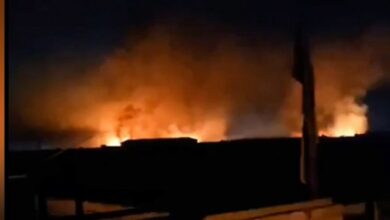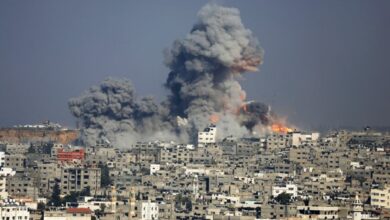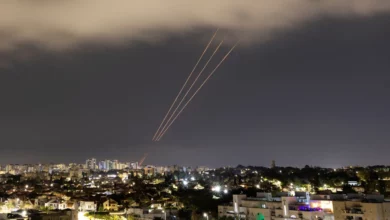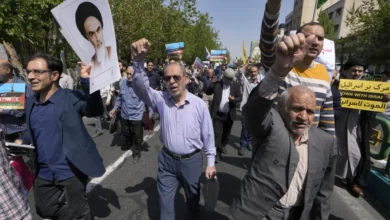Coordinated opposition to the underground wall currently being built in the Egyptian border town of Rafah along Egypt’s 14-kilometer border with the Gaza Strip–with the ostensible aim of curbing smuggling activities–has begun to take shape in the streets of Cairo and Beirut.
Yesterday in Cairo, about 300 activists–from a multiplicity of political trends–convened at the Egyptian Journalists Syndicate to protest construction of the underground wall, which began last December.
On 25 January, President Hosni Mubarak declared the barrier was not meant to "appease anyone," but rather "to protect our nation from terrorist plots like the ones that took place in Taba, Sharm el-Sheikh, Dahab and Cairo.” Between 2004 and 2006, all four of these locations witnessed bombings of varying lethality.
Besides protesting Egypt’s official border policy, demonstrations in Cairo and Beirut also targeted prominent Egyptian construction company Arab Contractors, the name of which has been linked to construction of the border barrier. Spokespeople for the company, however, have denied any involvement with the unpopular project.
“A journalist met with the company’s legal team, which confirmed that the company isn’t involved at all in construction of the wall–neither as the main contractor nor as an affiliate,” said Mohamed Waked, researcher with the Cairo-based Center for Socialist Studies. “We want to confirm all our information before launching a defamation campaign.”
Sources on the ground, however, tell a different story, saying that Arab Contractors is in fact involved in the wall’s construction.
“Two months ago, an engineer hired me to drive engineers, technicians and workers everyday from Al-Arish city [in the northern Sinai Peninsula] to the town of Rafah,” said one local driver, speaking on condition of anonymity given the issues’ sensitivity. The workers in question were employees of Arab Contractors, he added, going on to note that he drove about 14 people daily from chalets in Al-Arish to Rafah, where they participated in construction work.
One worker at the construction site told Al-Masry Al-Youm that he had been "temporarily employed" by Arab Contractors. “A second company will be responsible for finalizing construction to make sure the wall has been reinforced," he said, also insisting on anonymity. "And a third company is working on illuminating the borderline.”
According to this worker, the wall’s iron panels have been molded together with steel connections and are now in the process of being sunk into the ground. Dug to a depth of 18 to 25 meters, these iron panels are meant to thwart the digging of smuggling tunnels, which are generally no more than 30 meters deep.
The tunnels have been a vital means of channeling commodities into the embattled Gaza Strip, which has remained under an internationally-sanctioned siege–in which Egypt has played a major role–since 2007.
The state-owned Arab Contractors was established in 1953. Ever since, the company has specialized in housing, sanitary drainage, public buildings and bridge and tunnel projects. Its scope of operations currently extends into more than 29 countries.
The Cairo protest transcended the issue of the border wall and soon became a venue for criticizing Egypt-Israel rapprochement, which has been manifested in recent gas trade deals and security arrangements, along with other steps towards normalized diplomatic relations.
At the protest, socialist activist Kamal Khalil chanted slogans against the Oslo Accords and the Camp David Peace Treaty, describing both agreements as tools for a “submissive peace." Protestors also chanted: “You sell gas to Israel but can’t provide us with butane,” in reference to an ongoing shortage of butane gas cylinders that has led to violent rioting in some areas of the country.
Demonstrators held banners aloft, reading: “The wall of shame must come down”; “No to sponsoring Israeli crimes”; “Down with Mubarak, Netanyahu’s dog”; and “We want a president with dignity.”
In Beirut, a concurrent march from the Shatila refugee camp to the Egyptian Embassy was similarly staged to protest construction of the border wall. The march was organized by "Filasteen Hurra," or "Free Palestine," a group of left-leaning students that are coordinating their actions with Egyptian counterparts.
Another Lebanon-based group is the "Campaign to Stop the Wall of Shame," which, according to journalist and group member Ahmad Moore, plays more of a "lobbying" role. “Our campaign spoke to the Sidon Municipality because we know Arab Contractors have a presence there," said Moore.
Egyptian critics, meanwhile, condemn the government’s tendency to justify the wall’s construction by citing Egypt’s "national security."
“The ruling regime doesn’t have the right to invent its own national security, which should be decided by the people,” said Ashraf Hefni, secretary-general of the leftist Tagammu Party in North Sinai. “Egypt is strong when Sinai is strong and weak when Sinai is weak and dependent. We call for Sinai to become a real part of Egypt.”
Further actions are currently being planned in Cairo to protest the wall’s construction, including both lectures and film screenings. One lecture scheduled for next Tuesday will discuss a lawsuit raised by former diplomat Ibrahim Yousry against the state’s building of the border barrier. Another lecture, slated for next Wednesday, will brief listeners on all findings regarding the ongoing construction process.




